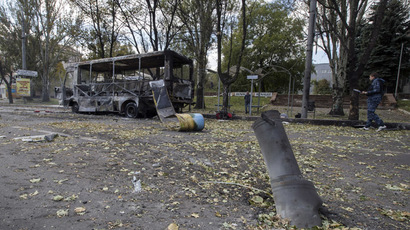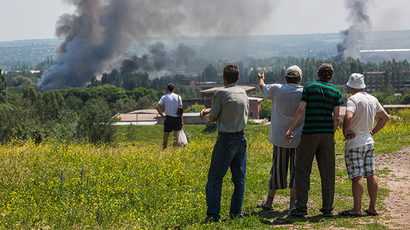'White phosphorus' reports: Ukraine military 'dropped incendiary bombs' on Slavyansk
Residents of Slavyansk and its suburbs were awoken overnight on Thursday by what they say were incendiary bombs that were dropped on their city by Kiev’s military. Witnesses and local media reports suggested that the bombs might be phosphorous.
Much of the village of Semyonovka, located in the Slavyansk suburbs, was set ablaze. Local residents told RT that the ground didn't stop burning for some time.
“We all saw what happened here yesterday. They used rocket launchers as well as incendiary bombs against us. The ground was on fire. How can the ground burn by itself. It burned for about forty minutes,” resident Roman Litvinov told RT over the phone.
“Starting from 2 a.m. everyone I’ve met has a sore throat and is coughing all the time. I think this is because of the burning. I think we’ll feel the true consequences later. There are still a lot of people here, a lot of children we haven’t managed to get out yet,” resident Tatyana told RT.
The use of incendiary bombs – designed to start fires using materials such as napalm, white phosphorus or other dangerous chemicals – is strictly prohibited by the UN.
Kiev authorities have denied reports that such weapons were used against civilians. The National Guard also refuted reports that phosphorous ammunition was used, its press service stated.
During the latest news briefing, State Department spokesperson Jen Psaki veered away from answering an AP journalist’s question about the reported use of white phosphorus bombs by Kiev’s army. But when cornered, she let it slip that she was quite clueless as to the situation on the ground – saying she thought the reference was to the Russians using the bombs.
When asked about the report for the second time, Psaki replied: "By whom? By Russians?”
The journalist replied: “No, by the Ukrainians,” specifying that there is video and photographic evidence of the attack.
Psaki replied by saying, “No, I didn’t see those reports.”
Slavyansk, an industrial city in southeastern Ukraine with a population of over 100,000 people, has been a focal point of the government’s crackdown against the region. The city’s residential area has been under regular artillery fire for weeks.
“It does appear that there is at least a case to be argued that something similar, if not itself white phosphorous, was used overnight. I’ve seen the video, I’ve looked at it closely...[there are] whole signs, whole marks of white phosphorous use. For example, a very bright light burning and multiple burns coming down from the sky. It’s an airburst weapon that has been used, such as a mortar or a manned aircraft,” Charles Shoebridge, a former army officer, Scotland Yard detective, and counter-terrorism intelligence officer who has recently returned from Ukraine, told RT.
“White phosphorous cannot be put out with the use of water” and it will “burn through one’s body to the bone,” Shoebridge added. “If there is going to be large amounts used it can also be a poison – large amounts can be set to contaminate water supply.”
According to the video, “it’s very likely that white phosphorus" was used, Shoebridge added. “It’s very difficult to fabricate the video we saw combined with the evidence on the ground.”
Moscow demanded an immediate investigation into the reported use of incendiary bombs in Ukraine, Russian Foreign Minister Sergey Lavrov said on Thursday.
"We are concerned to hear reports that the Ukrainian military forces use incendiary bombs and some other indiscriminate weapons," he said. "These reports should be probed into immediately."
On Thursday, Russia introduced a draft resolution to the UN Security Council that condemns attacks on residential quarters and civilian facilities in southeastern Ukraine, said Vitaly Churkin, Russian envoy to the UN.
He also voiced concern over reports of the use of prohibited ammunition, including incendiary bombs, during the military crackdown.
The draft resolution calls for an immediate end to all violence and for a lasting ceasefire.
"The draft resolution will aim to stop the violence and support the political efforts the OSCE has been undertaking in vain so far. We urge the UN Secretary-General to support them," Churkin said, adding that its adoption would demonstrate the UNSC’s support for the crisis settlement efforts.














